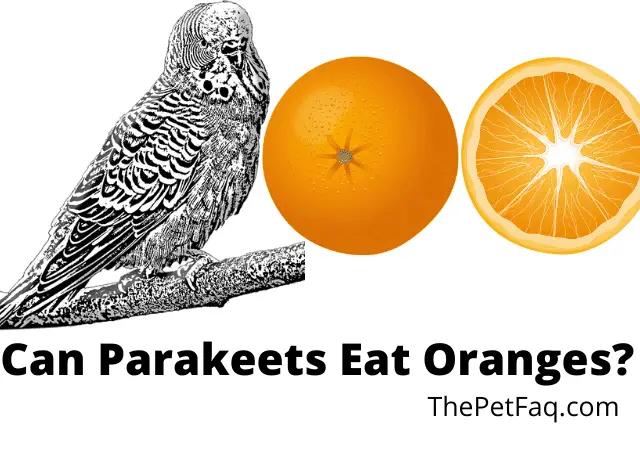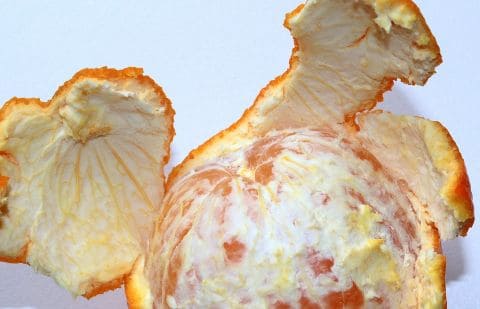Can parakeets eat oranges? Oranges are many people’s favorite foods. People eat them, drink their juice, or put them in smoothies. Since so many people eat this fruit frequently it’s not surprising that a large number of parakeet owners wonder if they can share their favorite fruit with their birds.
If you’ve ever wondered if you can give some oranges to your parakeet, then rest assured, you’re not alone. However, while I was wondering the same thing it was tough to find a definitive answer to this question. That’s why I decided that I would share my findings in this post – to once and for all give a complete overview of this topic!
You’ll be relieved to hear that parakeets can indeed eat oranges. These citrus fruits are completely safe for budgies to consume and can be part of a healthy diet. They contain a good amount of vitamins, minerals, and fiber which are all good for your bird’s well-being. As long as you make sure to not overfeed them, oranges can be a part of a healthy, balanced diet for your bird.
Keep reading, because in this post I’ll tell you everything you need to know to safely feed this delicious fruit to your bird.

What’s in an orange?

I’d like to begin by giving a quick overview of the orange. Now, I’m not going to bore you to death with a complete history of this fruit, if you’re interested in that I’ll refer you to the corresponding Wikipedia page. For our purposes, all we need to know is that they are round, juicy, orange delicious citrus fruits.
What I will do is give an overview of what exactly is in this fruit. By that, I mean the nutrients and vitamins and minerals. That way we can get an idea of what we’re putting in our parakeet’s mouth when we’re giving them a piece of it.
According to nutrition data, 100 grams of oranges contains the following macronutrients:
- 47 calories
- 87% water
- 0.9 grams of protein
- 11.8 grams of carbs
- 9.4 grams of sugar
- 2.4 grams of fiber
- 0.1 grams of fat
If we take a look at the nutrition data above, we see that they are low in calories and fat while being having relatively high sugar and fiber. Fiber is essential for a healthy digestive system.
But that’s not all; the most important reason to give oranges to your birdie is because of the vitamins and minerals. As is the case with most fruits, oranges have quite a lot of these essential nutrients. Let’s take a closer look to see which minerals and vitamins they have and what they can do to benefit your bird.
Vitamin C
Oranges are quite high in vitamin C. Vitamin C is an antioxidant that reduces the damage free radicals do in your bird’s body. That might sound complicated, but basically what it means is that vitamin C helps to prevent (or at least slow down) DNA damage and aging. It also is essential for a healthy immune system.
Potassium
These fruits also contain potassium which is another essential nutrient. Potassium has been proven to be good for a healthy heart. In addition, it’s good for their nervous system!
B Vitamins
Oranges also contain a good amount of vitamin B1 (Thiamine) and B9 (Folate). These B vitamins are essential for proper metabolic function and allow your bird to turn food into energy.
So are oranges good for budgies?
Parakeets can most definitely eat oranges and they’re good for them! They’re a great source of many vitamins, minerals, antioxidants, and fibers all while being low in calories and fats. Always make sure to give your birdie a balanced diet, something which these fruits can definitely be a part of.
One thing I’d like to say before you go dumping truckloads of oranges into your bird’s cage is that you should always introduce new foods to them slowly. That way their digestion can get used it the new food and you can monitor them to see if anything wrong happens. Animals can have allergies just like humans (source), so even though the chance is very small that this is the case for your budgie it’s still worth keeping an eye on.
Can parakeets eat orange peels?

You shouldn’t give your budgie a whole, unpeeled orange. You should cut it in slices first. The best way to give your parakeet an orange is to simply give them a small slice with the peel still on it. They will not eat the peel anyway and will only eat the juicy flesh of the fruit.
These birds eat enough fruits in nature to be smart enough to know what they can and can’t eat – they generally won’t try to eat the peel since they know it’s not really a part of the food.
You should wash the fruit before you do this though because the skin can have pesticides and other chemicals on it. If your bird does bite into the skin you don’t want them to consume that.
Do parakeets enjoy eating oranges?
Most parakeets absolutely love oranges. You can see many videos on YouTube where parakeets eat them. Check out this video for a cute example:
Generally speaking, parakeets are quite picky eaters, if they don’t like something they’ll just not eat it.
The best way to find out if your parakeet is an orange lover is by simply letting them try it. They’ll let you know soon enough if they want more (or less) of this in their diet.
Alternative fruits parakeets can eat
So, you’ve tried feeding your budgie some orange but he didn’t like it? That’s a shame, but there’s no need to worry. There are plenty of other fruits that you can give to your bird. To get your mind jogging, I’ll give you a list of ideas.
- Bananas
- Strawberries
- Mango
- Blueberries
- Watermelon
- Blackberries
In fact, parakeets can eat most fruits. There are only a few fruits that they can not eat such as avocados and apple seeds. It’s always recommended to do your research before feeding your parakeet something, but the fruits on this list are definitely safe to give to your bird.
Can parakeets eat mandarins, clementines, and tangerines?

Mandarins, clementines, and tangerines are pretty similar to orange so I figured I’d include them in this overview as well.
Since they are so similar, budgies can eat those just fine as well. The one difference is that you should remove the skin of the mandarin/clementine before you feed it to your birds.
Also, make sure to remove the seeds before feeding! Only mandarins and tangerines have seeds, clementines do not, so if you’ve got clementines you don’t have to worry about the seeds.
Conclusion
So, now you know everything you need to know about feeding oranges (and mandarins) to your parakeet! As we’ve discussed, you can definitely make these citrus fruits part of your budgie’s diet. Most parakeets absolutely love eating them and they’re a great source of many vitamins and minerals.
I hope this guide taught you some new information about how you can get the most out of day-to-day fruits like oranges for your pet. If there’s anything you feel like I’ve missed or if you want some more information, feel free to let me know by leaving a comment!
- How Long Do American Eskimo Dogs Live? Important Factors and Care Tips - September 29, 2023
- Do American Bulldogs Need Grooming? Essential Tips and Care Guidelines - September 29, 2023
- Do Bengal Cats Enjoy Playing? Essential Tips for Keeping Them Active - September 29, 2023